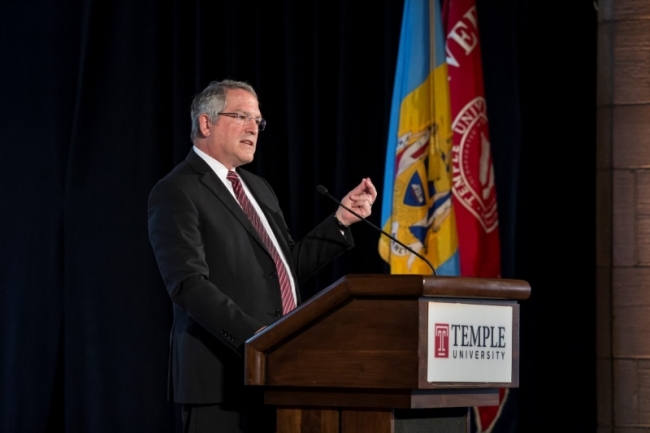You have /5 articles left.
Sign up for a free account or log in.

Temple University President Neil D. Theobald is resigning effective Aug. 1.
Temple University
Temple University President Neil D. Theobald will resign under a newly reached agreement, closing a tumultuous several weeks in which the university’s board prepared to fire the president after he unexpectedly dismissed its provost following a large financial-aid cost overrun.
Theobald’s resignation is effective Aug. 1. Temple trustees announced the agreement Thursday, when they had initially scheduled to vote on firing Theobald. Trustees last week voted no confidence in the president, who took over at Temple in 2012.
The resignation places Temple at a crossroads, with its top two administrative positions turning over this summer. Many see it as a major challenge for the Philadelphia university. But some faculty members feel it presents an opportunity to re-evaluate the direction of an institution that has turned its focus to rankings and research status in recent years.
For the immediate future, Temple is turning within itself for leadership. On Thursday the university named Richard M. Englert acting president. Englert has served in various administrative roles at Temple since coming to campus in 1976, including as acting president in 2012 for a short stint before Theobald’s tenure. Englert was appointed university chancellor, an honorary role, in 2012 and has been a professor in the College of Education.
Temple lists Englert as starting his latest stint as acting president on Thursday, despite the fact that Theobald’s departure is not yet effective. But all sides in administration are working in cooperation, said Kevin Feeley, a spokesman for Temple’s Board of Trustees.
“It’s really a distinction without difference,” Feeley said. “Dick Englert is an institution at Temple, so he’s going to be taking over the day-to-day operation.”
Feeley declined to discuss the terms of Theobald’s resignation, only confirming that some compensation was involved. Theobald did not lose his tenure on Temple's faculty but will be on sabbatical for a year, sources said.
It is early to discuss details about a search for a permanent replacement, Feeley said.
“The board’s view of this is that it’s all come up fairly quickly,” he said. “The board has been focused on this chapter. I think now that this chapter is over, we’ve turned a page, and I think the board understands this is going to be a comprehensive search process.”
Board of Trustees Chairman Patrick J. O’Connor released a statement saying that the deal leading to Theobald’s resignation was in the best interest of the university, students, faculty and staff.
“The board recognizes that the university has endured a difficult few weeks this summer, but we are confident that with today’s announcements, we can once again return our focus to Temple's tremendous momentum,” O’Connor said. “Throughout the region and around the world, a Temple education is valued as affordable, accessible and of the highest quality.”
Theobald’s resignation comes less than four weeks after the president surprised many at Temple by stripping provost duties from Hai-Lung Dai on June 28. That move followed news that Temple would need to spend $22 million more than expected in its financial aid budget for the upcoming fiscal year. Dai had been closely associated with Temple’s financial aid policies, but faculty members still protested his unexpected removal as provost.
Dai’s dismissal also involved a disputed sexual harassment charge. Theobald reportedly circulated a statement saying that a sexual harassment allegation against Dai was part of the reason for his firing. A Temple spokesman said the board was investigating that charge but felt it was baseless to link that claim to the provost's dismissal.
(The above paragraph has been updated to clarify that the spokesman was not commenting on the accuracy of the sexual harassment allegations, only on using them as a reason for Dai's removal.)
Dai issued a statement defending himself, indicating the complaint had been filed against him as retaliation for a disciplinary measure he took against someone for performance failures and that its nature had been unfairly characterized. Dai also said in a statement that responsibility for budget matters ultimately rests with the president.
Dai issued another statement Thursday listing Temple’s accomplishments during his tenure as provost, including increases in undergraduate enrollment and diversity, tuition revenue growth, and rising research grants. Dai also thanked faculty, staff, students and alumni for support.
“I am also grateful to the Board of Trustees for its most recent morally courageous acts,” Dai’s statement said. “Changing the presidency is a grave matter for any university. The soul of an institution of higher learning with a mission to discover and disseminate knowledge as truth is and should be embedded in its values and principles. So long as these values and principles are upheld, the institution will become better and stronger. We are grateful that the board has given the university this opportunity to recover and continue to fulfill its mission.”
But the future could hold debate about Temple’s priorities and direction. Theobald had backed a controversial plan to build a football stadium on campus. And while both the previous president and provost have touted Temple’s rise in rankings and research university classification, some have worried about the university’s identity.
“Everybody sort of likes the idea of moving up in the rankings and all that good stuff, but are we doing so perhaps at the cost of serving the population that we’ve traditionally said we’re supposed to be serving?” said Michael Sachs, the president of Temple’s Faculty Senate and a professor of kinesiology in the university’s College of Public Health. “Are we just bringing in these high-profile researchers and all these better students and losing a sense of our mission to serve first-generation students, etc.?”
Sachs said he found the two leadership changes in such a short period of time surprising. But he expressed confidence in Englert and the provost who replaced Dai, former Temple Law School Dean Joanne A. Epps.
“We have two excellent people who are coming into place -- a provost who is widely respected and we’re confident will do a great job, and an acting president who has been there, done that,” Sachs said.
Major turnover at the top can have long-term effects, however. Administrators in the university will use it as a time to evaluate their job situation, raising the possibility of major turnover among top talent, said Frank Casagrande, a higher education consultant. Controversial dismissals can also hurt an institution’s ability to recruit leaders in the future.
“The consequence to the organization is not just a disruption in the top team,” Casagrande said. “It’s the ability of the organization to recruit the next team.”
The situation has also raised some concerns among those on campus. Arthur Hochner is an associate professor in Temple’s Fox School of Business and the president and chief negotiator at the Temple Association of University Professionals. The union is negotiating with the university to add adjunct professors after they recently voted to unionize.
Hochner was disappointed faculty members did not have more say in or more information about the leadership turnover, he said.
“We really don’t know what the reasons are,” he said. “Where were the faculty in all of this? This affects the whole university, and it seems to be something that’s taken place within a small circle of people who haven’t explained their actions.”








